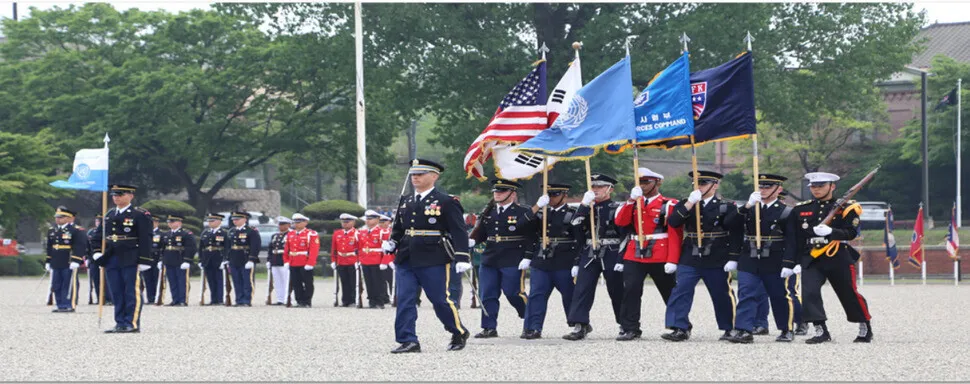hankyoreh
Links to other country sites 다른 나라 사이트 링크
[Editorial] Priority of joint S. Korea-US exercises should be OPCON transfer

South Korea and the US’ joint command post exercise for the second half of 2020 began on Aug. 18. But the exercise has been scaled down because of the COVID-19 pandemic, causing some components of “full operational capability” verification to be delayed until next year, stripping the exercise of much of its purpose.
Verifying the full operational capability (FOC) of the future Combined Forces Command (CFC) is a prerequisite for transferring wartime operational control (OPCON) of the South Korean military. Even so, we don’t think it’s impossible to complete the OPCON transfer before President Moon Jae-in leaves office. The government should persuade the US to adjust the requirements or timeframe so the OPCON transfer can go ahead as planned.
The government has planned to wrap up the OPCON transfer by the end of 2021, following FOC verification this year and “full mission capability” (FMC) verification next year. That plan is in keeping with the conditional OPCON transfer approach agreed to by top defense officials from South Korea and the US in October 2014, under former South Korean President Park Geun-hye. The government needs to pay heed to numerous experts who are critical of this plan, arguing that the US is exploiting the verification process to delay the OPCON transfer.
The original timeframe of the OPCON transfer under an agreement reached by South Korea and the US during the presidency of Roh Moo-hyun was Apr. 17, 2012. Even though Gen. Burwell Bell, commander of US Forces Korea, said that the OPCON transfer could take place by 2009 given the operational capability of the South Korean military, the Roh administration reportedly delayed the timeframe as late as possible, until 2012, in deference to the Ministry of National Defense (MND). A former high-ranking security official argues that the OPCON transfer could take place at once given South Korea’s current economic and military prowess.
Given these circumstances, we think the government could consider adjusting the assessment schedule. FOC and FMC verification, for example, could be carried out at the same time next year. If that’s a non-starter, the OPCON transfer could go ahead next year following FOC verification, with FMC verification taking place after the next president takes office in May 2022. The US would have to be convinced to sign off on any such schedule changes. Since the OPCON transfer is contingent not on any actual conditions but on the government’s will, Seoul should obviously engage in deliberations with the US if that is what’s necessary.
Please direct comments or questions to [english@hani.co.kr]

Editorial・opinion
![[Editorial] Abandoned appeal in 2019 lawmaker clash case raises questions about prosecutors’ standards [Editorial] Abandoned appeal in 2019 lawmaker clash case raises questions about prosecutors’ standards](https://flexible.img.hani.co.kr/flexible/normal/500/300/imgdb/original/2025/1128/1817643173126142.jpg) [Editorial] Abandoned appeal in 2019 lawmaker clash case raises questions about prosecutors’ standards
[Editorial] Abandoned appeal in 2019 lawmaker clash case raises questions about prosecutors’ standards![[Column] The origins of China’s real estate bubble [Column] The origins of China’s real estate bubble](https://flexible.img.hani.co.kr/flexible/normal/500/300/imgdb/original/2025/1127/3717642304508069.jpg) [Column] The origins of China’s real estate bubble
[Column] The origins of China’s real estate bubble- [Editorial] Was Yoon’s wife pulling the strings of those investigating her?
- [Column] Has Korean society become any safer since the martial law crisis?
- [Column] Japan’s quandary in the ‘new type of great power relations’
- [Editorial] Yoon proves himself a coward and a fool in court
- [Column] A prospect more worrying than a Korean Peninsula sans US
- [Column] There’s no solving the feud between Japan and China
- [Correspondent’s column] Goodbye MAGA, hello affordability?
- [Editorial] PPP lawmakers get slap on the wrist for violent violation of legislative procedure
Most viewed articles
- 1What’s really driving the drastic depreciation of Korea’s won
- 2Korean industries reeling on surging won-dollar exchange rate
- 3Korea sinks further into trade deficit with China amid inaction from government
- 4Won’s real effective exchange rate plummets to lowest level since 2009 financial crisis
- 5[Column] Russia and China’s golden ticket to destabilizing the dollar
- 685% of major Korean firms say political uncertainty could fuel exchange rate woes
- 7S. Korea, China renew their currency swap for additional five years to an increased US$59 billion
- 8Korea records first trade deficit with China since 1992
- 9Value of Korean won down 7.3% in 2024, a steeper plunge than during 2008 crisis
- 10[News analysis] The double-sided nature of South Korea’s growing diplomatic influence